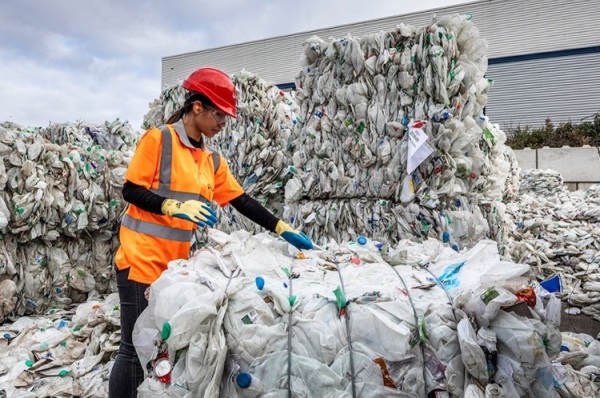In a significant stride toward environmental responsibility, the Central Board of Indirect Taxes and Customs (CBIC) recently issued a directive mandating that all importers of plastic raw materials—be it resins, pellets, or preforms—must furnish proof of registration on the Centralized Extended Producer Responsibility (EPR) Portal at the time of customs clearance. This marks a strategic pivot in India’s approach to plastic waste governance—transforming it from a fragmented, downstream-centric model into a system that embeds accountability right from the point of entry.
While the Plastic Waste Management (PWM) Rules and EPR Guidelines were already in place, the absence of customs-level enforcement meant a glaring loophole remained. With the CBIC’s Instruction No. 21/2025-Customs, that gap is now being firmly closed.
But what does this move mean for industry players? How will it reshape the operations, compliance dynamics, and circular economy aspirations of a nation already struggling with plastic overload?
To better understand the implications, TheCSRUniverse reached out to industry leaders for their insights.
 A welcome and necessary shift
A welcome and necessary shift
"This is a very timely and progressive step," remarks Kashyap Devulapally, Co-Founder and Chief Compliance Officer at Elima. For years, plastic raw materials like resins and preforms entered India without stringent downstream responsibility. While EPR compliance was already expected from Producers, Importers, and Brand Owners (PIBOs) dealing with finished packaging, enforcement on raw materials was inconsistent.
"By making EPR registration mandatory at the entry point, the government is reinforcing the message that environmental accountability must begin right from the source," Devulapally adds. This integrated approach strengthens the entire value chain, shifting the system from fragmented compliance to a framework where responsibility is embedded from the outset.
 Akshaya Rath, Co-founder and CEO of EcoEx, echoes this sentiment and sees the move as a cornerstone for India’s sustainability goals. "What gets measured, gets managed," he notes. "This mandate eliminates a regulatory gap and makes environmental compliance a precondition for market entry. It aligns perfectly with India’s efforts under Swachh Bharat Mission 2.0 and our circular economy aspirations."
Akshaya Rath, Co-founder and CEO of EcoEx, echoes this sentiment and sees the move as a cornerstone for India’s sustainability goals. "What gets measured, gets managed," he notes. "This mandate eliminates a regulatory gap and makes environmental compliance a precondition for market entry. It aligns perfectly with India’s efforts under Swachh Bharat Mission 2.0 and our circular economy aspirations."
Operational readiness: the new imperative
For importers, the directive is more than just a regulatory checkbox; it demands a fundamental shift in operational planning. They must now integrate EPR compliance into their import procedures. "This will require significant preparedness in documentation, coordination with CPCB and SPCBs, and adjustments in internal compliance systems," explains Devulapally. He cautions that businesses unfamiliar with EPR may face delays if registration is not secured before consignments reach Indian ports.
Rath highlights the improvements made by CPCB to make the process smoother.
"Currently, new registrations typically take 5–15 days, and the portal’s functionality has improved. However, businesses must proactively factor in these lead times to avoid customs holds, warehousing costs, or missed delivery schedules," he advises.
To minimize disruptions, embedding EPR checks into standard operating procedures and training procurement and logistics teams is now essential. The experts agree that a proactive mindset will be the key to navigating this tighter compliance regime.
Addressing the SME challenge
However, not all businesses are equally equipped to handle these changes. Small and medium enterprises (SMEs), which form a large segment of the import-driven supply chain, may find the transition particularly challenging. "Many SMEs may not even be aware that importing plastic raw materials now requires EPR compliance," warns Devulapally. "These businesses often lack in-house compliance teams, and a sudden customs hold could significantly disrupt operations."
Rath agrees, adding that while CPCB has launched awareness campaigns and streamlined processes, more needs to be done. Simplified registration procedures, regional helpdesks, FAQs, and even short grace periods for first-time registrants could help prevent unnecessary penalties and trade disruptions. Both experts advocate for stronger collaboration with industry associations to ensure SMEs can transition smoothly.
A ripple effect across the ecosystem
The implications of the CBIC directive extend well beyond importers. For domestic producers, it creates a more equitable competitive landscape. "Imported raw plastic can no longer bypass compliance that local manufacturers already follow," notes Devulapally. This could encourage fairer competition and incentivize innovation in sustainable material design.
For recyclers and waste processors, the directive is expected to drive increased demand for verified plastic recovery and recycling certificates. "This could catalyze investment in infrastructure and higher standards across the recycling industry," says Rath. As more businesses seek to offset their plastic footprint, the market for plastic credits is likely to expand, further reinforcing India’s push toward a circular economy.
From compliance to cultural change
Ultimately, the CBIC directive is not just about plugging regulatory gaps—it represents a deeper cultural change. By embedding accountability at the point of import, it challenges businesses to rethink their role in the plastic value chain. "This is more than a compliance update—it’s a policy shift toward long-term environmental responsibility," says Devulapally.
Rath reinforces this perspective: "The mandate pushes companies to treat materials as valuable resources, not waste. It will drive innovation in packaging design, encourage investment in traceability technologies, and foster collaboration between waste generators and processors."
Looking ahead
While the transition may bring short-term challenges—particularly for SMEs—the long-term benefits are substantial. The directive strengthens India’s plastic waste management framework, enhances data quality, and supports the country’s climate and waste reduction targets for 2030 and 2070.
As TheCSRUniverse observes, this is a pivotal moment for the industry. The message is clear: environmental accountability is no longer optional. By insisting on EPR registration at customs clearance, India has set a precedent for treating sustainability as an integral part of business operations.
"This mandate is crucial—not just for managing plastic, but for redefining how we do business in a sustainable India," concludes Rath.
For businesses, the path forward is equally clear: register, reassess, and reinvent. Embracing this change will not only ensure compliance but also position them as leaders in India’s journey towards a truly circular economy.





 A welcome and necessary shift
A welcome and necessary shift Akshaya Rath, Co-founder and CEO of EcoEx, echoes this sentiment and sees the move as a cornerstone for India’s sustainability goals. "What gets measured, gets managed," he notes. "This mandate eliminates a regulatory gap and makes environmental compliance a precondition for market entry. It aligns perfectly with India’s efforts under Swachh Bharat Mission 2.0 and our circular economy aspirations."
Akshaya Rath, Co-founder and CEO of EcoEx, echoes this sentiment and sees the move as a cornerstone for India’s sustainability goals. "What gets measured, gets managed," he notes. "This mandate eliminates a regulatory gap and makes environmental compliance a precondition for market entry. It aligns perfectly with India’s efforts under Swachh Bharat Mission 2.0 and our circular economy aspirations."












.jpg)



